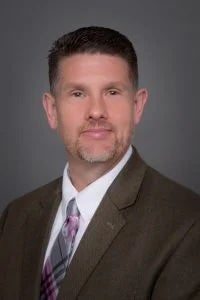Biography
Clinical Expertise:
- Orthopedic Physical Therapy
Research/Scholarly Interests:
- Assessment and treatment of non-acute low back pain
- Chronic Pain
- Sensorimotor training
- Orthopedic tests and measures
- Athletic performance assessment and performance enhancement
Over my 36+ years in clinical practice, I’ve witnessed the remarkable evolution of the healthcare field. Today’s physical therapists face increasing pressures and challenges, including the need to screen for severe medical conditions, facilitate medical imaging referrals, achieve faster progress within fewer sessions, meticulously document outcomes, and demonstrate their value to both patients and the healthcare system. Meeting these demands requires new physical therapy graduates to have enhanced theoretical knowledge, advanced hands-on skills, extensive training, and a deep understanding of the complex healthcare landscape.
As a result, it is crucial for physical therapy faculty to not only understand these changes but also adapt their teaching methods to prepare graduates for this dynamic environment. Educators must develop effective instructional strategies that translate information and skills efficiently. Additionally, program administrators and faculty need to act as role models and mentors, guiding the educational experience and fostering a collaborative relationship with students. As the Program Director/Chairperson, I am dedicated to being a positive role model, offering leadership and mentorship to both students and faculty.
My teaching philosophy blends traditional coaching methods with a modern appreciation for educational practices. Reflecting on the educators who have profoundly impacted my career, I recognize those who shared their knowledge and passion while also challenging me to explore my own strengths and limitations. Just as a coach cannot play the game for an athlete and a professor cannot learn on behalf of a student, my role is to inspire, motivate, and challenge students to realize their full potential. I firmly believe in setting ambitious yet attainable goals for myself and my students, and I strive for open and respectful communication in all interactions.
Central to my philosophy are the principles of service learning, hands-on laboratory experiences, and regular, incremental practice. Both the brain and muscles benefit from repetitive, graded exercises—muscle growth is known as hypertrophy, and cognitive development is referred to as neuroplasticity. As an educator, my primary responsibility is to ensure that your cognitive abilities are continuously and effectively exercised, preparing you to tackle the challenges of clinical practice with confidence.

